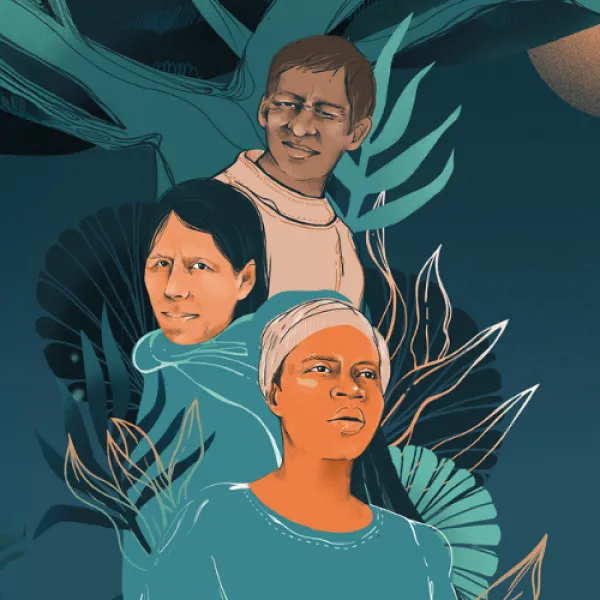
Opinión Consultiva 32: Inter-American Court Links Climate Crisis to Human Rights
Photo: Inter-American Court of Human Rights.
On July 3, 2025, the Inter-American Court of Human Rights released its Advisory Opinion No. 32 (OC-32/25) on the climate emergency and human rights, in which it established concrete obligations for governments across the continent to effectively protect people affected by the climate crisis, which implies guaranteeing the human right to a healthy climate as part of the right to a healthy environment. This is the first time that a regional human rights court made such a pronouncement. Learn how this decision protects vulnerable communities and guides decisions made by national and international courts.
What Are Advisory Opinions of the Inter-American Court?
Advisory Opinions are authoritative interpretations of a legal provision or issue, intended to help States understand and fulfill their obligations under the American Convention on Human Rights and other relevant international instruments.
These Opinions are important because they establish the proper interpretation of human rights norms, guiding States on how to uphold and implement them within their territories or jurisdictions.
The Inter-American Court issues Advisory Opinions at the request of member countries of the Organization of American States (OAS) or certain affiliated bodies.
What Is Advisory Opinion No. 32 on the Climate Emergency and Human Rights?
In a historic step forward for climate justice, the Inter-American Court of Human Rights issued an Advisory Opinion in response to a request made by the governments of Colombia and Chile. This Opinion clearly defines the obligations of States across the Americas to protect human rights in the face of the climate crisis.
In their request, Colombia and Chile emphasized the disproportionate impacts of climate change on countries in the Global South—those least responsible for the crisis—and particularly on communities in situations of vulnerability due to factors such as geography, climate, socio-economic status, gender, age, and race.
Advisory Opinion No. 32 (OC-32/25) addressed the obligations of States to:
- Protect and uphold human rights in the context of the climate emergency.
- Preserve the right to life and survival based on the best available scientific knowledge.
- Safeguard children and future generations.
- Ensure access to effective legal remedies, protection, and reparation for climate-related harms.
- Protect human rights defenders, women, Indigenous Peoples, and Afro-descendant communities.
- Guarantee the right to a healthy environment in the context of the climate emergency.
- Uphold the principle of Common but Differentiated Responsibilities and Respective Capabilities.
Like other Advisory Opinions issued by the Inter-American Court, the decision carries legal weight and authoritative interpretive value for all OAS member states.
It serves as a vital tool for guiding decisions by judges and other justice system actors. Additionally, it provides a clearer and more robust legal framework for individuals, communities, organizations, and authorities working to defend the environment and human rights amid the climate crisis.
A Turning Point for Climate Justice
Advisory Opinion No. 32 (OC-32/25) from the Inter-American Court of Human Rights marks a decisive moment for climate justice in Latin America and beyond. For the first time, a regional human rights court pronounced in a broad and comprehensive manner to clarify the obligations of States in the Americas to address the climate emergency as a human rights issue.
This decision goes beyond the legal realm—it is a concrete tool for transformation, representing:
Clarity on State Obligations
With the OC-32/25, the Inter-American Court clarified the legal duties of Latin American States to address the climate crisis as a matter of human rights. This requires States to acknowledge their responsibility to reduce greenhouse gas emissions, support adaptation measures, and establish mechanisms to address loss and damage.
New Legal Standards for the Region
The decision set legal standards that governments across the continent must meet to protect human rights in the face of the climate crisis. These standards shapes a legal framework that can influence decisions by national and international courts, climate negotiations, public policy, and advocacy efforts worldwide.
Strengthening of Climate Litigation
By providing authoritative interpretations of human rights treaties adopted by States in the region, it offers strong legal arguments to support judicial rulings holding governments, corporations, and other actors accountable for the causes and consequences of the climate crisis—thereby strengthening the growing global movement for climate litigation.
Recognition of Specific Vulnerabilities and Traditional Knowledge
The OC-32/25 enables greater recognition and visibility of how the climate crisis disproportionately impacts Indigenous Peoples, women, children, and other vulnerable groups. It establishes differentiated State obligations to protect them, marking a key step toward safeguarding the rights of present and future generations. It also recognizes local, traditional and indigenous knowledge as part of the “best available science” for solutions to the global crisis.
Momentum for the Climate Justice Movement
The OC-32/25 came at a critical moment, as the climate justice movement in Latin America and around the world gains momentum through successful strategic litigation and innovative legal precedents. It reinforces the understanding that climate action by States is a legal obligation—not a voluntary commitment—in the eyes of international courts.
This decision by the Court is not merely a legal interpretation—it is a declaration that protecting the climate means protecting life, dignity, and the future of the region.
7 KEY TAKEAWAYS FROM THIS MILESTONE FOR GLOBAL CLIMATE JUSTICE

Practical toolkit for using Advisory Opinion 32/25 in the pursuit of climate justice
More than 20 experts and organizations—including AIDA—created a new publication analyzing the Court's decision with an emphasis on its practical applications.
Climate Justice and Human Rights: Legal Standards and Tools from the Inter-American Court’s Advisory Opinion 32/25 is a tool to facilitate understanding of the Court's decision and promote concrete legal and political actions to protect communities and ecosystems from the climate emergency.
It is addressed to individuals, communities, organizations, and networks working on the climate crisis and human rights issues, providing them with standards and practical recommendations to strengthen their litigation and advocacy strategies and efforts, enabling them to:
- Shaping urgent protection actions for frontline communities.
- Strengthening advocacy campaigns with legal backing.
- Informing climate legislation and public policy debates.
- Supporting community-led demands for adaptation and resilience.
- Integrating human rights standards into strategic litigation.
At AIDA, we believe it is essential to serve as a bridge for defenders who fight every day for life. We work to transform the traditionally exclusive dynamics of international decision-making spaces by promoting the exchange of diverse knowledge systems and ensuring that decisions about nature include the voices of those who protect it and live in harmony with it.
Voices from the Frontlines: Impacts and Proposals Rooted in Local Knowledge
At a historic moment for climate justice, the voices of the communities most affected by the climate crisis were heard directly by the judges of the Inter-American Court of Human Rights.
This marked a significant milestone in participation and access to justice: people who face the consequences of the climate emergency every day spoke before the region’s highest human rights court, sharing how the climate crisis and environmental injustice are affecting their ways of life—and what they propose the Court should do to help uphold their rights amid this global crisis and the actions taken to confront it.
Why is this participation so important?
The climate crisis is not an abstract problem. It is the river that dries up, leaving entire communities without water. It is the flood that destroys ancestral crops. It is the rising sea level that forces families to leave their territories. It is the extreme temperatures that threaten the health of children and the elderly.
Only those who live these realities can truly explain how the climate emergency violates fundamental rights such as life, health, food, territory, and culture.
The Inter-American Court needed to hear these voices to understand that protecting the climate is not merely an environmental duty—it is an urgent human rights obligation, with names, faces, and homelands behind it.
AIDA’s Role in This Historic Decision
From the outset of the process, AIDA has played a proactive role, amplifying the participation of communities in Latin America affected by the climate crisis:
We supported various communities across the region to ensure their voices were heard by the Inter-American Court through the submission of legal briefs highlighting the socio-environmental impacts of the climate emergency on Indigenous Peoples, women, children, and people of diverse gender identities and orientations.
We accompanied community representatives in participating in the hearings held in April and May 2024, in Barbados and Brazil, respectively.
We submitted our own legal brief to the Inter-American Court, arguing that the right to a “stable and safe climate” should be recognized as part of the universal right to a healthy environment, and emphasizing States’ obligations to prevent and mitigate the harmful effects of the climate emergency on their populations.
